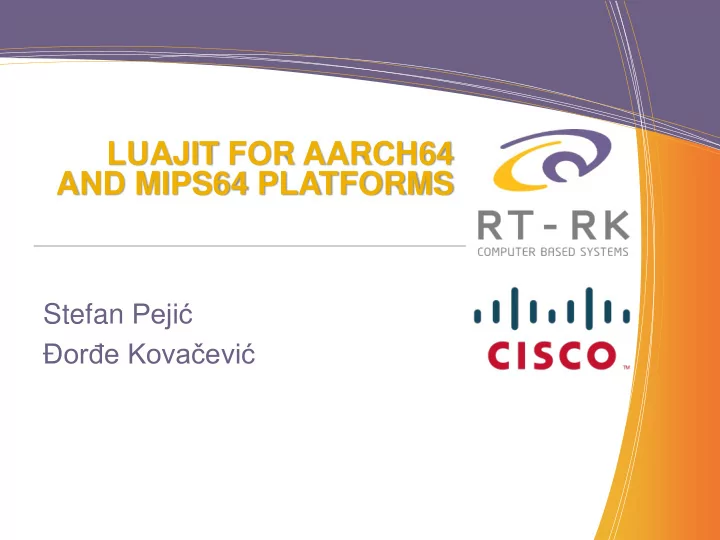

LUAJIT FOR AARCH64 AND MIPS64 PLATFORMS Stefan Pejić Đorđe Kovačević
LuaJIT LuaJIT 2.0.4 (release) No MIPS64 support No ARM64 support LuaJIT 2.1 (development branch) ARM64 interpreter ARM64 JIT (as of November) MIPS64 interpreter (as of May) MIPS64 hard-float JIT (patch submitted) MIPS64 soft-float JIT (coming soon) 2
GC64 mode LuaJIT 2.0.4 supports only 32 bit GC references (suboptimal for 64 bit architectures) LuaJIT 2.1 introduces GC64 mode 47 bit pointers + 17 (13+4) bit tags At first, available only in interpreter mode x64 and ARM64 In JIT mode first available for x64 3
32 bit GC references (!LJ_GC64) 64 bit objects (NaN tagged) 32 bits for type 32 bits for pointers (with an exception) ---MSW---.---LSW--- primitive types | itype | | lightuserdata | itype | void * | (32 bit) lightuserdata |ffff| void * | (64 bit) GC objects | itype | GCRef | int (LJ_DUALNUM)| itype | int | number -------double------ 4
64 bit GC references (LJ_GC64) 64 bit objects (NaN tagged) 17 (13+4) bits for type 47 bits for pointers ------MSW------.------LSW------ primitive types |1..1|itype|1..................1| GC objects/lightud |1..1|itype|-------GCRef--------| int (LJ_DUALNUM) |1..1|itype|0..0|-----int-------| number ------------double------------- 5
ARM64 GC reference handling Pointer extraction: #define LJ_GCVMASK (((uint64_t)1 << 47) - 1) and x0, x0, #LJ_GCVMASK Pointer tagging: movn x0, #~LJ_TTAB add x1, x1, x0, lsl #47 Typecheck: asr x0, x1, 47 cmn x0, #-LJ_TTAB bne target 6
MIPS64 GC reference handling Pointer extraction: dextm r1, r2, 0, 14 Pointer tagging: li r1, LJ_TTAB dinsu r2, r1, 15, 31 Typecheck: dsra r1, r2, 47 daddiu r1, r1, -LJ_TTAB bnez target 7
JIT port Implement missing pieces in interpreter (vm_*.dasc) Add missing instructions (lj_target_*.h) Implement emitters for different instruction types (lj_emit_*.h) Implement IR to machine code transformation (lj_asm_*.h) Implement disassembler (dasm_*.lua) 8
Interpreter (vm_*.dasc) Hot loop detection, exits, stitching, etc. vm_exit_handler: ubfx CARG2w, CARG2w, #5, #16 ... str CARG1w, [GL, #GL_J(exitno)] ldr CARG1, [sp, #64*8] str CARG2w, [GL, #GL_J(parent)] add CARG3, sp, #64*8 str L, [GL, #GL_J(L)] mv_vmstate CARG4, EXIT str xzr, GL->jit_base stp xzr, CARG3, [sp, #62*8] add CARG1, GL, #GG_G2J sub CARG1, CARG1, lr mov CARG2, sp ldr L, GL->cur_L bl extern lj_trace_exit lsr CARG1, CARG1, #2 ldr CARG2, L->cframe ldr BASE, GL->jit_base ldr BASE, L->base sub CARG1, CARG1, #2 and sp, CARG2, #CFRAME_RAWMASK ldr CARG2w, [lr] ldr PC, SAVE_PC st_vmstate CARG4 str L, SAVE_L str BASE, L->base b >1 9
Target-specific definitions (lj_target_*.h) Registers, instructions, instruction fields, etc. Instruction field encoding: Instruction encoding: #define A64F_D(r) (r) #define A64F_N(r) ((r) << 5) typedef enum A64Ins { #define A64F_A(r) ((r) << 10) ... #define A64F_M(r) ((r) << 16) A64I_ADDx = 0x8b000000, #define A64F_IMMS(x) ((x) << 10) A64I_ANDx = 0x8a000000, #define A64F_IMMR(x) ((x) << 16) A64I_CMPx = 0xeb00001f, #define A64F_U16(x) ((x) << 5) A64I_LDRw = 0xb9400000, #define A64F_U12(x) ((x) << 10) A64I_STPw = 0x29000000, #define A64F_S26(x) (x) A64I_FCVT_F32_F64 = 0x1e624000, A64I_FCVT_F64_F32 = 0x1e22c000 ... } A64Ins; 10
Instruction emitter (lj_emit_*.h) static void emit_dnm(ASMState *as, A64Ins ai, Reg rd, Reg rn, Reg rm) { *--as->mcp = ai | A64F_D(rd) | A64F_N(rn) | A64F_M(rm); } static void emit_branch(ASMState *as, A64Ins ai, MCode *target) { MCode *p = --as->mcp; ptrdiff_t delta = target - p; lua_assert(((delta + 0x02000000) >> 26) == 0); *p = ai | ((uint32_t)delta & 0x03ffffffu); } 11
Instruction emitter (lj_emit_*.h) /* Get/set from constant pointer. */ static void emit_lsptr(ASMState *as, A64Ins ai, Reg r, void *p) { /* First, check if ip + offset is in range. */ if ((ai & 0x00400000) && checkmcpofs(as, p)) { emit_d(as, A64I_LDRLx | A64F_S19(mcpofs(as, p)>>2), r); } else { Reg base = RID_GL; /* Next, try GL + offset. */ int64_t ofs = glofs(as, p); /* Else split up into base reg + offset. */ if (!emit_checkofs(ai, ofs)) { int64_t i64 = i64ptr(p); base = ra_allock(as, (i64 & ~0x7fffull), rset_exclude(RSET_GPR, r)); ofs = i64 & 0x7fffull; } emit_lso(as, ai, r, base, ofs); } } 12
IR assembler (lj_asm_*.h) static void asm_intmin_max(ASMState *as, IRIns *ir, A64CC cc) { Reg dest = ra_dest(as, ir, RSET_GPR); Reg left = ra_hintalloc(as, ir->op1, dest, RSET_GPR); Reg right = ra_alloc1(as, ir->op2, rset_exclude(RSET_GPR, left)); emit_dnm(as, A64I_CSELw|A64F_CC(cc), dest, left, right); emit_nm(as, A64I_CMPw, left, right); } static void asm_min_max(ASMState *as, IRIns *ir, A64CC cc, A64CC fcc) { if (irt_isnum(ir->t)) asm_fpmin_max(as, ir, fcc); else asm_intmin_max(as, ir, cc); } #define asm_max(as, ir) asm_min_max(as, ir, CC_GT, CC_HI) #define asm_min(as, ir) asm_min_max(as, ir, CC_LT, CC_LO) 13
Optimizations Fusing multiple instructions into one add + mul madd and + cmp + b.cc tbz/tbnz cmp(0) + b.cc cbz/cbnz and + shift ubfm or + shr + shl extr/ror Loading constants 14
MIPS64 JIT MIPS64 hard-float Similar to ARM64 MIPS64 soft-float JIT currently doesn’t support 64 bit soft -float architectures Disable splitting 64 bit IRs into multiple 32 bit IRs for soft- float cases Handle floating-point arithmetic 15
Performance on ARM64 recursive fib recursive-ack nsieve nbody Lua 5.1 vs LuaJIT mandelbrot LuaJIT: interpreter vs. JIT life fasta fannkuch array 3d 1x 2x 4x 8x 16x 32x 16
Contact Đorđe Kovačević: djordje.lj.kovacevic@rt-rk.com Stefan Pejić: stefan.pejic@rt-rk.com 17
Recommend
More recommend